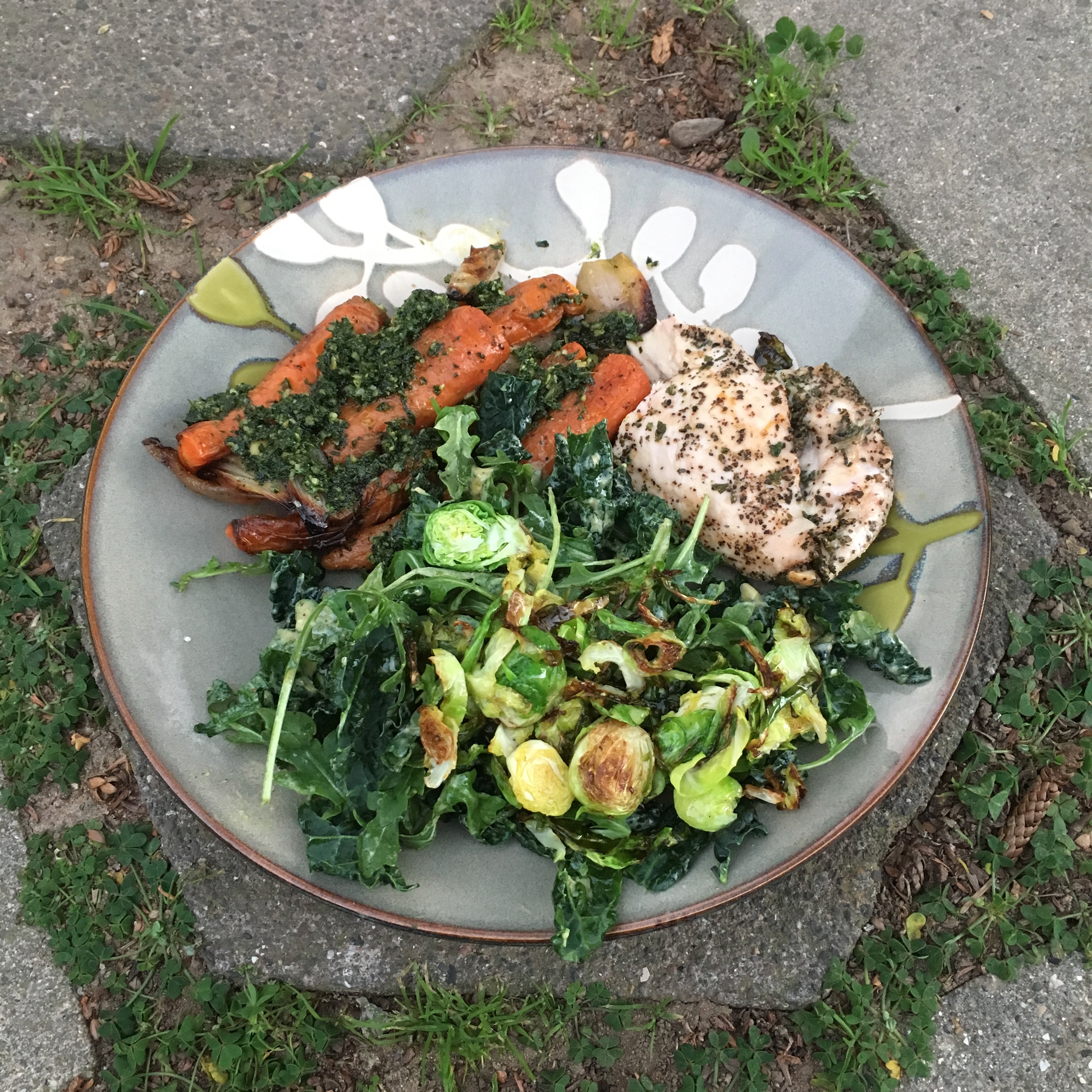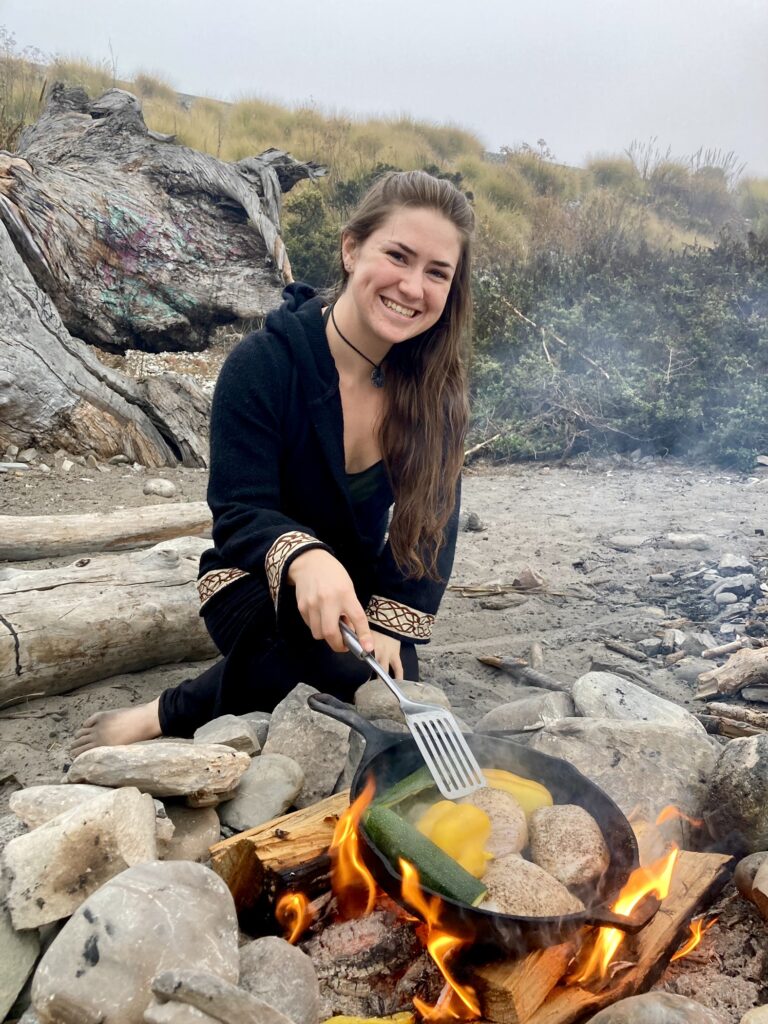Overcome Your Gut + Digestive Issues With Ancestral Nutrition
Why I’m No Longer Vegan/Vegetarian

The other day my friend asked me why I stopped being vegan/vegetarian. After writing her a lengthy response, I decided to share my story on here as well. In this post I will discuss:
- Why I was vegetarian and then vegan
- Why I quit veganism and returned to vegetarianism
- What brought back the meat?
- The nutritional value of animal products
- How eating meat is not wrong, it’s part of nature
- How to have respect for animals when you eat them
- How my body responded to meat
- How I eat now
Why I was Vegetarian and Then Vegan

I think it’s important to first understand why I was Vegan/Vegetarian, in order to better understand the mindset and health shift I had when going back to eating meat. Most of my life I was vegetarian. From ages 8 to 19 to be specific. And for 1 year and 10 months of that time I was vegan.
I first became vegetarian when I was 8, shortly after my brother and father did. My main reason for this was because I didn’t want animals to die, especially when their sacrifice seemed unnecessary. Over the years my reasoning grew stronger. I learned about the mistreatment of animals raised for meat and the potential health consequences of consuming meat.
When I was 16. I watched a vegan documentary “Vegucated” which showed the cruelties of factory farming, not just in animals raised for meat, but in animals raised for eggs and dairy too. After learning the cruelty behind the eggs and dairy industry, I felt morally obligated to become vegan.
Why I Quit Veganism and Returned to Vegetarianism

On the vegan diet, I never had my period, my digestion was the worse it’s ever been. I was constantly bloated, gassy, constipated, and had no appetite. I became very skinny, got light headed easily, and lacked energy.
After 1 year and 10 months on the vegan diet, a family member helped me realize that it was harming my body. This was really hard to hear. Like so many others I had come to believe that this diet was the best for humans, animals, and the planet. This comment shattered my perception. Yet it was true.
That same family member told me that I could get my eggs and dairy from local humane farms and not support factory farming. I wouldn’t be supporting an industry that harms animals and I could still prioritize my own health. That sat well with me so I decided to reintroduce eggs and dairy.
A month after doing so, my period returned. This amazed me. I had returned to a healthy weight 6 months ago but was not able to menstruate till I started eating eggs and dairy. I assume I was deficient in cholesterol, which is critical for hormone production. My digestion also improved (but it wasn’t prefect), my relationship with food improved, and my body felt more nourished.
What Brought Back the Meat?

Nutrition and nature brought back the meat.
Nutrition:
Fast forward another few years till I’m 19. I’d been weightlifting for over 2 years and began looking into nutrition for training. I found out that I was eating far less protein than recommended for muscle growth (I was eating roughly 50 g/day while about 140 g/day was recommended for me). At first I tried to up my protein while sticking with a vegetarian diet, but I couldn’t seem to get above 80g a day on a 2000 Calorie diet.
And there was another issue, plant protein is less bioavailable then animal proteins. This means it’s harder to digest and absorb plant proteins so a smaller percentage of protein from plants gets absorbed and utilized by your body. To make up for this loss, it’s recommended that vegans and vegetarians eat 10% more protein. So I needed even more protein (about 154g / day) and I was only getting half that.
Another issue with plant based protein is the amino acid profile. Proteins are made up of amino acids. Proteins from animal products are called complete proteins because they contain all 9 essential amino acids (amino acids that your body can’t make or can’t make a sufficient amount of) in the right proportions. These amino acids all have different functions vital to your health. Such as building muscle, regulating immune function, synthesizing hormones and neurotransmitters, and so much more.
Plant proteins on the other hand, are almost always incomplete proteins (proteins that do not contain all the essential amino acids in sufficient amounts). If getting your protein from plants, it’s important to complement proteins (eat various types of proteins together such as rice with beans in order to get all the essential amino acids). While this is definitely possible, it much more difficult and less reliable than getting your amino acids from meat based sources.
Learning all this led me to consider eating meat to better support my training and overall health. This was no easy choice and it didn’t happen overnight. For most of my life I had believed that killing animals was wrong. However, this contemplation allowed new thoughts to battle old ones which lead me to a new perspective.
Nature:
The new perspective: eating meat is not wrong, it’s part of nature.

The more I thought about it, the more I realized that death is a necessary and natural sacrifice for life. Look at the animal kingdom. Lions eat zebras, polar bears eat seals, many birds eat fish, and the list goes on. The death of the prey is essential for the predators to live. Just as the death of plants is necessary for herbivores to live. Whether the food is plants or animals, life is taken in order to survive.
This balance of life and death helps to keep populations in check and leads to a healthy ecosystem. A great example of this is the reintroduction of wolves into Yellowstone National Park. These wolves hunted and killed deer and elk which created a chain reaction that set the ecosystem back into balance. Death is a necessary part of life, there is no way around it.

While some think of humans as separate from nature, I am a firm believer that we are part of nature. When it comes to eating plants or animals, I look to our ancestors. Humans have been omnivores for hundreds of thousands of years. Our bodies are designed to eat meat. We have smaller stomachs and colons, stronger acidity in our stomachs, and can’t digest cellulose just like animals that eat a meat based diet. Why would we deny our nature? After all a lion does not. He kills and eats his prey because it is in his nature to do so.
Some might argue that we have so many more food options than a lion so this comparison is not applicable, however I disagree. While we do have tons of food options, a lot of them are utter crap and do not nourish your body. Nourishing foods available to us include meat, fish, eggs, dairy, veggies, fruit, nuts, and other whole foods. And in order to optimally fuel your body with all the nutrients it needs, consuming animals and animal products is our best option. Certain nutrients like vitamin B12, creatine, carnosine, vitamin D3, DHA, heme iron, and taurine are only available in animal products (the important functions of these nutrients are discussed in this article https://www.healthline.com/nutrition/7-nutrients-you-cant-get-from-plants#5 ). Also nutrients are generally present in higher amounts and are more bioavailable (more easily absorbed) in animal foods.
Respect for animals

You can care about animals and still eat meat. Why wouldn’t you love that which brings you life and health. I respect the animals sacrifice by consuming all of the animal: muscle meat, organs, bones (used to make bone broth), and the animal fat (used in cooking) like our hunter gather ancestors did.
I also source my meat from local humane farms as much as possible. I believe factory farming is cruel. Raising animals stuffed in large warehouses, crates, and cages; pumping them full of hormones and feeding them loads of genetically modified corn and soy; raising them with no regard to their living standards purely to make an easy profit is utterly disgusting. Instead I support local humane farms where animals have a quality life with fields to roam in, grass to graze on, shade to settler under, and room to roam freely.
In this way I show love and respect to the animals I eat.
How My Body Responded to Meat

Now that you know why I started eating meat again, I want to let you know how that affected me physically. Eating meat worked great for my body. My digestion became the strongest it had ever been, my constipation went away and I stopped farting (this was a serious issue for me in the past), I lost a little body fat, my bloating significantly reduced, and I just felt all around fueled and strong.
How I Eat Now

It has been almost 2 years since I started eating meat and I continue to learn more and more about healthy eating. This journey to find out how to optimally fuel my body has lead me to an ancestral meat based ketogenic diet.
What does that mean?
I eat similar to our hunter gather ancestors. No sugar, grains, beans, legumes, or other high carb foods. I eat a lot of animal products (eggs, muscle meat, organ meat, fish, dairy, bone broth and bacon fat) along with some veggies, spices, and occasionally nuts. Since I eat high fat and protein with low carbs this is a ketogenic diet.
I eat this way because all of the research I’ve done about eating healthy has lead me here. I constantly learn new things and tweak my diet. It’s never perfect I can always improve.
Conclusion
I hope this article helped you understand the mindset change I had when switching from a vegan / vegetarian diet to a meat based diet and I hope you learned something useful to your own health journey!

